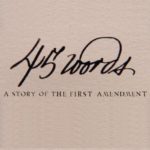In this lesson students have the opportunity to discuss how words have the power to bring about political, social, or economic change in society. By reviewing quotations from various leaders, activists, and others, students can begin to understand how ideas have an impact on the hearts and minds of people and can be a catalyst for change. Finally, students will reflect on the words of Martin Luther King Jr. and determine their relevance to the political, social, and economic issues of today.
Civic Art Project: Notes on the Constitution
Students create art works based on an examination of the language of the Constitution and the personal connections they make. These art works will incorporate words, illustrations, and mixed media images.
This lesson can be adapted for different grade levels. High school students can use an abridged version of the U.S. Constitution. Elementary and middle school students can use the Preamble, or introduction, to the Constitution.
Civic Art Project: From Her Beacon
Students will work collaboratively to create a mural of the Statue of Liberty to show the statue as a representation of freedom and a symbol of welcome to immigrants coming from other countries. This lesson can be adapted for different grade levels. High school students will read a poem and incorporate some of its ideas into their mural. Elementary and middle school students will incorporate words and phrases inspired by the statue into their mural. This activity supports Art, Social Studies, Civics, and English Language Arts standards and can be used as a cross-curricular project across these classrooms. Teachers across the curricula are encouraged to work together to bring this activity to life.
Preamble of the Constitution Activity Sheet
Students can use this activity sheet to draw ideas about what different phrases and words in the Preamble mean.
Starter Kit: Judicial Branch Podcast
The Supreme Court, considered by some to be the most powerful branch, had humble beginnings. How did it stop being, in the words of Alexander Hamilton, “”next to nothing?” Do politics affect the court’s decisions? And how do cases even get there?
This episode features Larry Robbins, lawyer and eighteen-time advocate in the Supreme Court, and Kathryn DePalo, professor at Florida International University and past president of the Florida Political Science Association.
This short episode includes a one-page Graphic Organizer for students to take notes on while listening, as well as discussion questions on the back side.
Civic Friendship: ‘I Am Rooting Hard for You’
“You will be our President when you read this note. I wish you well. I wish your family well. Your success now is our country’s success. I am rooting hard for you.”
It doesn’t sound like a note that a politician would write to the man who had just defeated him in a hotly contested election for the highest office in the nation just a few months prior, yet these are the exact words penned by President George H.W. Bush to his successor, newly inaugurated President Bill Clinton, on January 20, 1993. Many of the tributes to the former president recounted the story of this note as evidence of the character of the man, of his grace and humility. In this eLesson, students will explore the importance of character traits like humility and respect in the individuals who hold public office and how commitment to the rule of law has sustained the executive branch throughout the country’s history.
The Constitutional Convention: Four Founding Fathers You May Never Have Met

Introduce your students to four key, but relatively unknown, contributors to the U.S. Constitution — Oliver Ellsworth, Alexander Hamilton, William Paterson, and Edmund Randolph. Learn through their words and the words of others how the Founding Fathers created “a model of cooperative statesmanship and the art of compromise.”
Amendment Worth A Thousand Words
With many pictures posted all over every social media platform, the #amendmentworthathousandwords’ overall mission will be to enlighten many of the rights promised to people by the Constitution. Through this challenge, many will become aware of their rights and what the Constitution does not only for them, but for all Americans as well! Lesson plan by Eboni Jenerette
“45 Words” Video Lesson
Martin’s Big Words
In this lesson, students will experience unequal treatment first hand – some will receive a sticker based on an arbitrary characteristic, like hair color – and by discussing their reactions, they will come to understand the meaning of equality. Students will learn about the life and dream of Dr. Martin Luther King and write about what his dream for equality means in their own lives.
